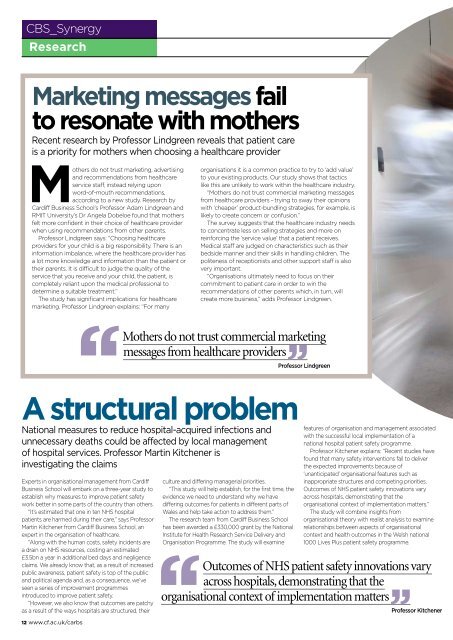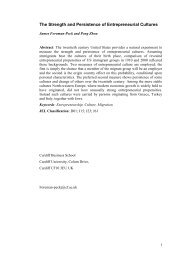Issue 12 (Summer 2011) - Cardiff Business School - Cardiff University
Issue 12 (Summer 2011) - Cardiff Business School - Cardiff University
Issue 12 (Summer 2011) - Cardiff Business School - Cardiff University
Create successful ePaper yourself
Turn your PDF publications into a flip-book with our unique Google optimized e-Paper software.
CBS_Synergy<br />
Research<br />
Marketing messages fail<br />
to resonate with mothers<br />
Recent research by Professor Lindgreen reveals that patient care<br />
is a priority for mothers when choosing a healthcare provider<br />
Mothers do not trust marketing, advertising<br />
and recommendations from healthcare<br />
service staff, instead relying upon<br />
word-of-mouth recommendations,<br />
according to a new study. Research by<br />
<strong>Cardiff</strong> <strong>Business</strong> <strong>School</strong>’s Professor Adam Lindgreen and<br />
RMIT <strong>University</strong>’s Dr Angela Dobeloe found that mothers<br />
felt more confident in their choice of healthcare provider<br />
when using recommendations from other parents.<br />
Professor Lindgreen says: “Choosing healthcare<br />
providers for your child is a big responsibility. There is an<br />
information imbalance, where the healthcare provider has<br />
a lot more knowledge and information than the patient or<br />
their parents. It is difficult to judge the quality of the<br />
service that you receive and your child, the patient, is<br />
completely reliant upon the medical professional to<br />
determine a suitable treatment.”<br />
The study has significant implications for healthcare<br />
marketing. Professor Lindgreen explains: “For many<br />
organisations it is a common practice to try to ‘add value’<br />
to your existing products. Our study shows that tactics<br />
like this are unlikely to work within the healthcare industry.<br />
“Mothers do not trust commercial marketing messages<br />
from healthcare providers – trying to sway their opinions<br />
with ‘cheaper’ product-bundling strategies, for example, is<br />
likely to create concern or confusion.”<br />
The survey suggests that the healthcare industry needs<br />
to concentrate less on selling strategies and more on<br />
reinforcing the ‘service value’ that a patient receives.<br />
Medical staff are judged on characteristics such as their<br />
bedside manner and their skills in handling children. The<br />
politeness of receptionists and other support staff is also<br />
very important.<br />
“Organisations ultimately need to focus on their<br />
commitment to patient care in order to win the<br />
recommendations of other parents which, in turn, will<br />
create more business,” adds Professor Lindgreen.<br />
Mothers do not trust commercial marketing<br />
messages from healthcare providers<br />
Professor Lindgreen<br />
A structural problem<br />
National measures to reduce hospital-acquired infections and<br />
unnecessary deaths could be affected by local management<br />
of hospital services. Professor Martin Kitchener is<br />
investigating the claims<br />
Experts in organisational management from <strong>Cardiff</strong><br />
<strong>Business</strong> <strong>School</strong> will embark on a three-year study to<br />
establish why measures to improve patient safety<br />
work better in some parts of the country than others.<br />
“It’s estimated that one in ten NHS hospital<br />
patients are harmed during their care,” says Professor<br />
Martin Kitchener from <strong>Cardiff</strong> <strong>Business</strong> <strong>School</strong>, an<br />
expert in the organisation of healthcare.<br />
“Along with the human costs, safety incidents are<br />
a drain on NHS resources, costing an estimated<br />
£3.5bn a year in additional bed days and negligence<br />
claims. We already know that, as a result of increased<br />
public awareness, patient safety is top of the public<br />
and political agenda and, as a consequence, we’ve<br />
seen a series of improvement programmes<br />
introduced to improve patient safety.<br />
“However, we also know that outcomes are patchy<br />
as a result of the ways hospitals are structured, their<br />
<strong>12</strong> www.cf.ac.uk/carbs<br />
culture and differing managerial priorities.<br />
“This study will help establish, for the first time, the<br />
evidence we need to understand why we have<br />
differing outcomes for patients in different parts of<br />
Wales and help take action to address them.”<br />
The research team from <strong>Cardiff</strong> <strong>Business</strong> <strong>School</strong><br />
has been awarded a £330,000 grant by the National<br />
Institute for Health Research Service Delivery and<br />
Organisation Programme. The study will examine<br />
features of organisation and management associated<br />
with the successful local implementation of a<br />
national hospital patient safety programme.<br />
Professor Kitchener explains: “Recent studies have<br />
found that many safety interventions fail to deliver<br />
the expected improvements because of<br />
‘unanticipated’ organisational features such as<br />
inappropriate structures and competing priorities.<br />
Outcomes of NHS patient safety innovations vary<br />
across hospitals, demonstrating that the<br />
organisational context of implementation matters.”<br />
The study will combine insights from<br />
organisational theory with realist analysis to examine<br />
relationships between aspects of organisational<br />
context and health outcomes in the Welsh national<br />
1000 Lives Plus patient safety programme.<br />
Outcomes of NHS patient safety innovations vary<br />
across hospitals, demonstrating that the<br />
organisational context of implementation matters<br />
Professor Kitchener






